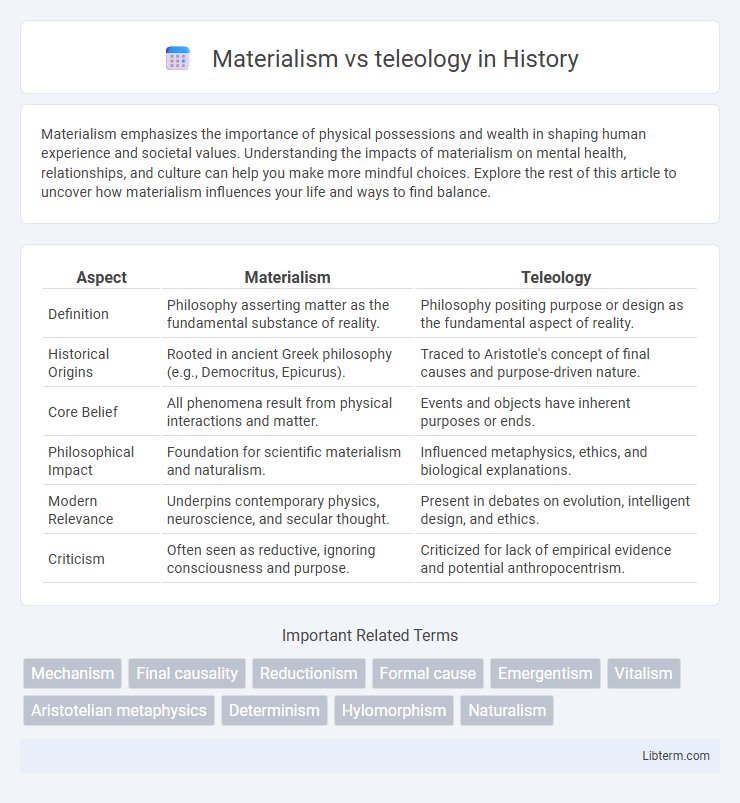Materialism emphasizes the importance of physical possessions and wealth in shaping human experience and societal values. Understanding the impacts of materialism on mental health, relationships, and culture can help you make more mindful choices. Explore the rest of this article to uncover how materialism influences your life and ways to find balance.
Table of Comparison
| Aspect | Materialism | Teleology |
|---|---|---|
| Definition | Philosophy asserting matter as the fundamental substance of reality. | Philosophy positing purpose or design as the fundamental aspect of reality. |
| Historical Origins | Rooted in ancient Greek philosophy (e.g., Democritus, Epicurus). | Traced to Aristotle's concept of final causes and purpose-driven nature. |
| Core Belief | All phenomena result from physical interactions and matter. | Events and objects have inherent purposes or ends. |
| Philosophical Impact | Foundation for scientific materialism and naturalism. | Influenced metaphysics, ethics, and biological explanations. |
| Modern Relevance | Underpins contemporary physics, neuroscience, and secular thought. | Present in debates on evolution, intelligent design, and ethics. |
| Criticism | Often seen as reductive, ignoring consciousness and purpose. | Criticized for lack of empirical evidence and potential anthropocentrism. |
Defining Materialism and Teleology
Materialism defines reality through physical substances and processes, asserting that all phenomena originate from material interactions without intrinsic purpose. Teleology emphasizes goal-directedness or inherent purpose in natural phenomena, suggesting entities and events unfold according to predetermined ends. These contrasting views shape philosophical discourse on causality, existence, and the nature of life.
Historical Roots of Materialism
The historical roots of materialism trace back to ancient Greek philosophers such as Democritus and Epicurus, who proposed that all phenomena result from physical matter and atomic interactions. This worldview contrasts sharply with teleology, which attributes purpose and final causes to natural processes, as prominently argued by Aristotle. The rise of Enlightenment thinkers like Hobbes and Spinoza further advanced materialism by emphasizing mechanistic explanations and rejecting metaphysical purposes in nature.
Teleology in Ancient and Modern Philosophy
Teleology in Ancient Philosophy is deeply rooted in Aristotle's concept of final causes, where natural phenomena are explained by their inherent purposes or ends, emphasizing the intrinsic goal-directedness of nature. In Modern Philosophy, teleology evolves through thinkers like Kant, who frames teleological judgment as a necessary regulative principle for understanding biological organisms and purposeful structures without reducing them to mere mechanical causation. The ongoing debate contrasts teleological perspectives that attribute intentionality and purpose to natural processes with Materialism's focus on physical causality and empirical explanation.
Core Principles of Materialism
Materialism centers on the principle that all phenomena, including consciousness and thought, arise from physical matter and its interactions, rejecting any inherent purpose or final cause in nature. It asserts that the universe operates through natural laws without teleological goals or design, emphasizing empirical evidence and observable processes. This framework contrasts with teleology, which interprets events and entities as directed toward specific ends or purposes.
Core Principles of Teleology
Teleology centers on the principle that natural phenomena and human actions are directed toward purposeful ends or goals, emphasizing intrinsic purposes rather than random occurrences. It asserts that every entity possesses an inherent final cause, shaping its behavior and development in alignment with this predetermined objective. This contrasts sharply with materialism, which explains phenomena solely through physical causes and processes without attributing intentionality or purpose.
Materialism vs Teleology in Science
Materialism in science emphasizes that all phenomena, including consciousness and life, arise from material interactions governed by physical laws, rejecting any intrinsic purpose or final cause. Teleology attributes purpose or goal-directedness to natural processes, suggesting that biological and cosmic phenomena unfold according to predefined ends or functions. Scientific practice predominantly favors materialism for its testability and empirical basis, while teleological explanations are often regarded as metaphysical or heuristic rather than scientific.
Impact on Ethics and Morality
Materialism emphasizes physical phenomena as the basis of reality, leading to ethical frameworks grounded in observable consequences and empirical human welfare. Teleology, focusing on purpose and inherent goals, shapes morality through intrinsic values and end-directed reasoning, often linking ethics to the fulfillment of natural or divine purposes. The contrast influences debates on moral objectivity, with materialism favoring consequentialist ethics and teleology underpinning virtue ethics or deontological principles.
Materialism and Teleology in Religion
Materialism in religion asserts that all spiritual phenomena can be explained by physical processes, denying the existence of supernatural purposes or final causes. Teleology in religion emphasizes purposeful design and intrinsic ends, positing that divine intention shapes the universe and human existence. The contrast between materialism and teleology frames debates on whether religious beliefs are grounded in empirical reality or guided by metaphysical purpose.
Contemporary Debates and Critiques
Contemporary debates on materialism versus teleology focus on the explanatory power of physical processes versus purposive explanations in nature. Critics of materialism argue that it fails to account for intentionality and meaning, while teleological perspectives are challenged for lacking empirical rigor. Advances in quantum biology and cognitive science continually reshape these discussions, highlighting gaps in strictly materialist frameworks and prompting reevaluations of teleological notions in scientific contexts.
Future Perspectives on Materialism and Teleology
Future perspectives on materialism emphasize advancements in neuroscience and quantum physics, suggesting that all phenomena can eventually be explained through physical processes and laws. Teleology, however, gains renewed interest in the context of artificial intelligence and complex systems, where purpose-driven behavior emerges from adaptive algorithms and self-organization. Integrating materialist science with teleological insights could pave the way for a more comprehensive understanding of consciousness and intentionality in natural and artificial entities.
Materialism Infographic

 libterm.com
libterm.com